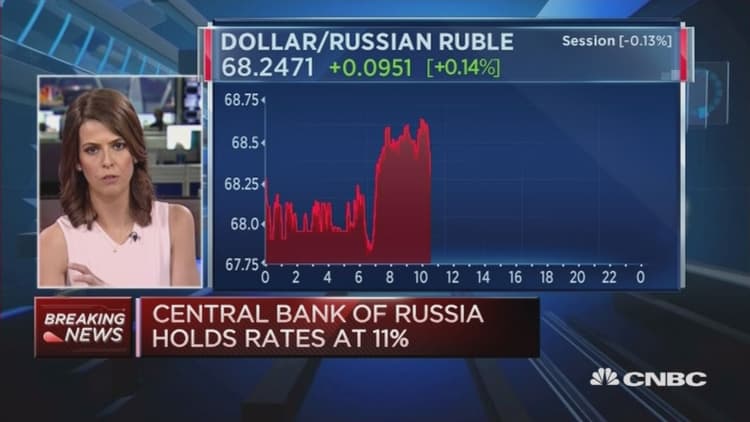
Russia's central bank held interest rates steady on Friday, warning that inflation risks remained "high" and the oil price rise could be "unsustainable."
The central bank kept its key rate at 11 percent , as widely expected by analysts.
In the bank's statement accompanying the decision, it said it had made the decision "despite certain stabilization in financial and commodity markets and a slowdown in inflation, inflation risks remain high."
The decision comes at a time of renewed hope for Russia's beleaguered economy and businesses with oil and other commodity prices showing tentative signs of recovery.
Despite reasons to be cheerful, however, the central bank warned that "the current oil market still features a continued oversupply, on the backdrop of a slowdown in the Chinese economy, more supplies originating from Iran and tighter competition for market share."
"This is why the certain recovery in crude prices seen in the recent weeks may prove to be unsustainable. In recognition of this, the Bank of Russia assumed in its baseline scenario the average forecast oil price of $30 per barrel in 2016 (below the current price), with its gradual rise to $40 per barrel to 2018."
The ruble strengthened to 67.98 per U.S. dollar following the decision. The central bank said in its statement that recent ruble weakness had also boosted inflationary pressures.
"Despite growing oil prices and ruble strengthening in the latest period, the accumulated weakening of the ruble, impacted by the drop in oil prices, between late 2015 and early 2016, is still putting pro-inflationary pressure on the economy, contributing to continued high inflation expectations."
Ahead of the decision, analysts cited by TASS had noted that the case for holding rather than cutting rates was not clear cut, however, and the central bank did not rule out increasing rates last month.
Of particular concern is the shaky decline recently in the rate of inflation. While inflation has been steadily trending downwards, at 8.1 percent as of February, on a weekly basis inflation rose in early March signaling that the trend might not be as solid as hoped.
Looking ahead, the central bank estimated annual inflation "will total less than 6 percent in March 2017, to reach the 4 percent target in late 2017" provided, it said, that there are "no new shocks emerging."
However, the bank did not rule out further interest rate increases, saying that "to enable the accomplishment of inflation targets, the Bank of Russia may conduct its moderately tight monetary policy for a more prolonged time than previously planned."
The nascent recovery in oil prices should be a cause for optimism for major oil producer Russia which was hit hard by the sharp decline in prices over the last 20 months or so. Combined with sanctions for its annexation of Crimea in early 2014 and role in the pro-Russian uprising in east Ukraine, the economy has suffered a recession as a result.
Last month, the central bank issued a gloomy forecast that then low oil prices and lower global prices for Russian exports (such as commodities) were likely to result "in a more sizable GDP contraction in 2016 than forecast previously in the baseline scenario."
It forecast that GDP the growth rate would enter positive territory in 2017, "but will be low." Analysts will be waiting to see whether the more hopeful tone in commodity markets could prompt the central bank to be cautiously optimistic in its latest monetary policy decision.



